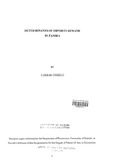| dc.description.abstract | This study utilizes an error correction model to examine the determination of aggregate
imports and components in Zambia between 1965 and 1997. The estimation results
indicate that, in the short-run, (lagged) foreign exchange receipts, international reserves,
real income and previous imports all significantly determined the behaviour of aggregate
imports over the reference period. Findings also show that aggregate imports were not
significantly responsive to relative import prices. The non-significance of the relative
price elasticity suggests that trade policies that concentrated overly on expenditure switching
such as tariff and non-tariff restrictions or devaluations did not, over the study
period, effectively assist trade policy reform efforts. On the other hand, the significance
of the foreign exchange receipts, international reserves and real income elasticities
suggest that policies which directly enhance foreign exchange availability and promote
stabilization are likely to have a greater impact on import volumes than policies that only
act on the aggregate demand for imports. Thus, policy-makers aiming to significantly
influence imports demand would do so more effectively through the latter policies . | en |

